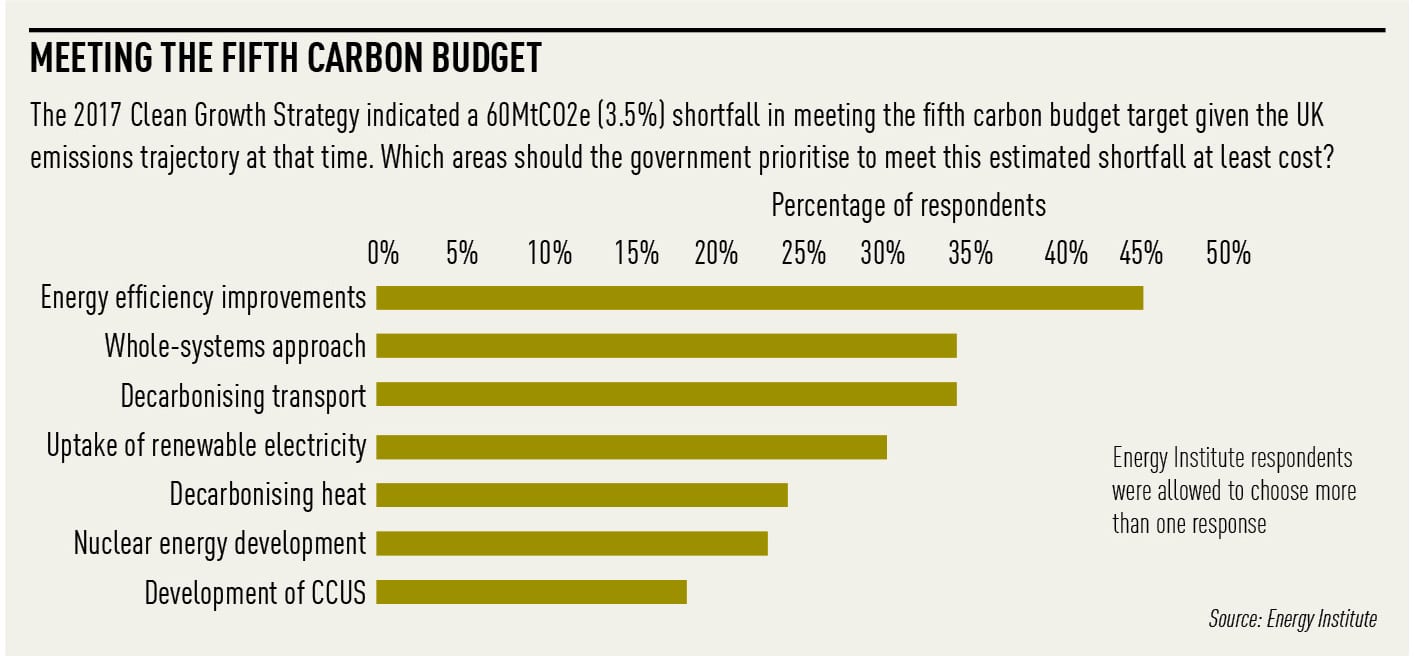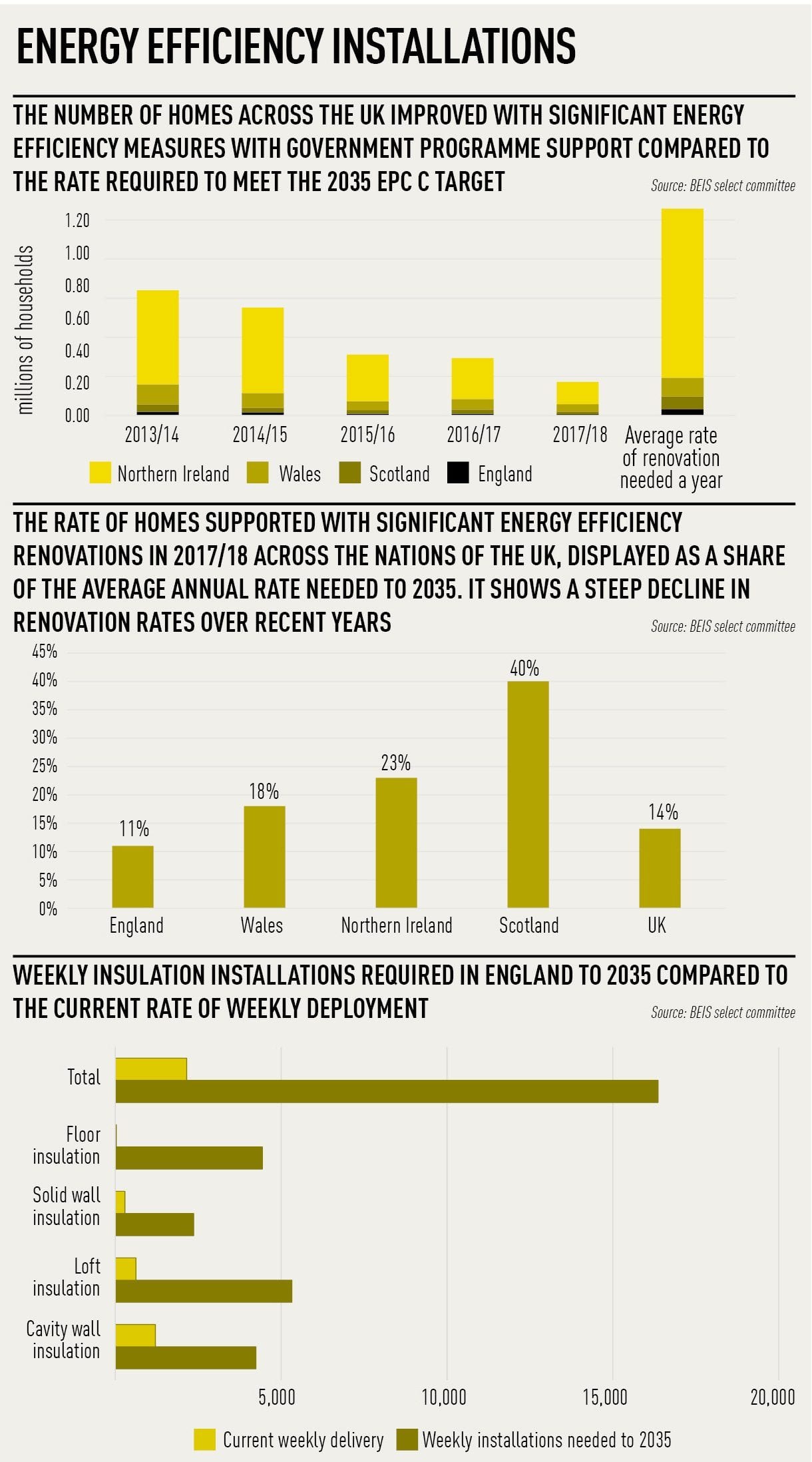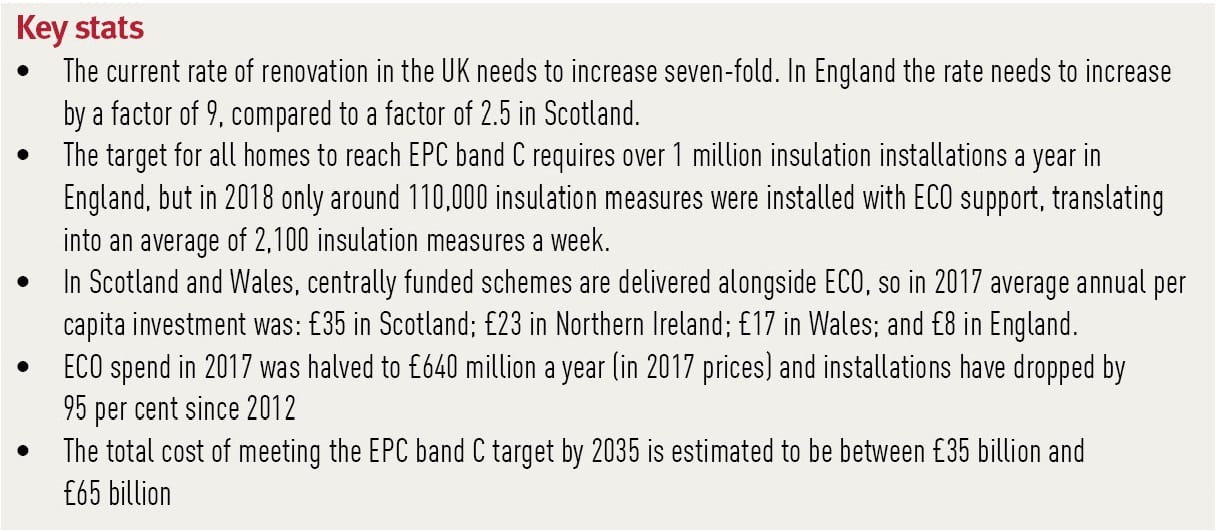This is the Sponsored paywall logged out

Insulating buildings is essential if the UK is to meet its emission targets, but there is a lack of political will to drive it up the agenda.

If there is one aspect of the route to achieving net zero that all can agree on, it’s the need to reinvigorate policy and accelerate actions to tackle energy efficiency.
The widespread deployment of energy efficiency measures across the UK’s buildings is a key pillar to meet net zero greenhouse gas emissions by 2050, and to tackle fuel poverty and cut energy bills. Energy efficiency investment also has the potential to unlock substantial long-term economic returns – for every £1 spent on insulating the fabric of a building, £3 is generated in economic benefits.
The government has an ambition in this area, published in the 2017 Clean Growth Strategy, to lift the efficiency of all new homes in England to an energy performance certificate grade C or higher by 2035. Currently just 15 per cent of homes in the UK fit into this category. Alongside this it wants industry to reduce energy consumption by 20 per cent. The ambition has certainly been lauded. The problem is, as organisations like the Energy Saving Trust point out, “the policies are not in place to achieve it”.
Going backwards
Despite accepting the importance of energy efficiency, progress has gone into reverse gear in recent years as funding has dwindled and political focus been lost. Heating buildings accounts for 32 per cent of carbon emissions – and of this, 22 per cent is from homes. But since 2012 there has been a 95 per cent reduction in the rate of energy efficiency measures installed in English homes, according to the Energy Savings Trust. So while the destination for the utility of the future is clear, the route map is missing.
For years, the key driver in the energy efficiency market has been subsidies through supplier obligations such as the Energy Company Obligation rather than private finance. In the domestic sector alone, it is estimated that additional private investment of around £3.5 billion per year is needed on energy efficiency measures to achieve the level of change required between now and 2035 – with government estimates of the total amount needed at between £35 billion and £65 billion.
A host of reports and warnings about the need to accelerate progress culminated last month in a stern rebuke from the department of Business, Energy and Industrial Strategy (BEIS) select committee, which concluded that the government is off-track to meet its energy efficiency targets and that major policy gaps still exist.
“The UK’s building stock remains one of the most inefficient in Europe. If the government will not back energy efficiency, one of the cheapest ways to reduce our carbon emissions, it will not bode well for the other, costlier actions required for decarbonisation,” it argued.
The committee was told by Lord Deben, Chairman of the Committee on Climate Change (CCC), that “energy efficiency is by far the cheapest way of reducing our emissions” and that “low carbon heat cannot be deployed cost-effectively unless buildings are properly insulated”. The committee reported that the total system cost of heat decarbonisation could be £6.2 billion higher per year to 2050 without energy efficiency.
The committee points to a lack of political will and woeful funding and sets out a series of measures that would put the government back on track – including mirroring the approach taken by Scotland setting up centralised funding to sit alongside the Energy Company Obligation (ECO).
The ECO scheme started operating in January 2013, and by December 2018 had delivered around 2.5 million improvements, in approximately 2 million homes. While this is impressive it is nowhere near the rates of improvement needed. The scheme operates across Great Britain and targets low-income, vulnerable and fuel-poor households. It is supplier led and funded via a levy on energy bills. ECO itself has had its funding halved over recent years, operating now at £640 million a year, from an original budget of £1.3 billion. At one point with other schemes thrown in, this was up at nearly £1.6 billion.
Certainly, the findings and recommendations of the BEIS committee chime with the opinions of energy leaders who been have urging action for some time. When asked which measures the government should pursue in order to reach emissions targets cost-effectively, Energy Institute members have put energy efficiency improvements in the top spot for the past three years in its annual barometer .

Eon UK’s chief executive, Michael Lewis, has been calling for huge increases in spending on energy efficiency, tax incentives and more stringent regulation. The National Infrastructure Commission has called for efficiency improvements to be treated as critical infrastructure – recommendations backed by BEIS.
Critics have been hoping for a kick-start to the programme to emerge in a long-awaited white paper. The turmoil in Number 10 would appear to have put paid to this for now. Instead, the day before Boris Johnson was announced as the new prime minister (alongside new ministers at BEIS) a rash of consultations and policy documents were rushed out by the department.
BEIS consultations
One of the consultations was what amounted to a call for ideas that would promote energy saving by “creating new markets for energy efficiency, securing its role in the wider energy market, contributing to flexibility and becoming a reliable alternative to increased generation and network reinforcement”, said the 15-page document.
BEIS says it is looking at a whole-systems approach to energy efficiency this time around, having earlier consulted on how to promote energy efficiency in the domestic market. However, this latest consultation appears to be more a cry for help than a direction of travel. One of the few key messages it conveyed was that energy efficiency would not be eligible to bid in the capacity market.
In terms of tackling energy efficiency in the building stock per se it was largely silent. Another consultation, looking at fuel poverty, was also missing big announcements and solutions, addressing mainly proposed changes to the measurement of fuel poverty.
There was no signs of extra cash, or financial incentives to get back on track with insulating the building stock, or a replacement for the Green Deal, the flagship policy originally hatched under a Labour government to encourage homeowners to improve the energy efficiency of their homes by borrowing to finance improvements against savings they would make from their energy bills. It was scrapped in 2015 following low take-up and concerns about standards of workmanship.
David Joffe, team leader, economy-wide analysis, at the Committee on Climate Change, says: “Nothing has come along to replace the Green Deal. It came to a grinding halt five years ago and since then we’ve lacked an effective energy efficiency policy. We need to get back on track.”
Dan Alchin, deputy director, retail at Energy UK, agrees: “We need funding and the right mechanisms, and also to create demand – which the Green Deal never addressed. There is no silver bullet; a package of measures is needed.
“I’d like to think the conversation around net zero will push energy efficiency back up the agenda and spark conversations about what’s possible – to meet the 2035 target we need £4-£5 billion every year.”
The BEIS select committee reports the need to increase insulation actions seven-fold. The technology is there, says Alchin, including for properties with solid walls. “It is expensive, but if we create a market, that will drive innovation.”
Filippo Gaddo, head of energy economics at Arup, also points to the need to raise the game when it comes to energy efficiency, and quickly. “There is a knowledge gap that needs to be addressed both in terms of domestic and commercial [properties],” he says. He welcomes government plans to set up an ECO scheme for small businesses, which it has recently consulted on.
Arup was commissioned by Lord Deben to write a strategy for increasing energy efficiency, which was published in May 2016. It acknowledges, as did subsequent reports, the need to shake the public out of its apathy towards saving energy. Gaddo says we need to sell the message about how carbon dioxide emissions are polluting the environment in the same way single use plastics are doing to the environment.
Joanne Wade, deputy director at the Association for Decentralised Energy (ADE), also picks up the theme: “It is not top of the priority list for energy consumers. It’s all very well telling someone they can save a couple of hundred pounds on their energy bill, but for a lot of consumers, that’s not enough to engage them in the action.
“I think people need to understand what they can do, which isn’t really explained well enough currently. We need more advice, and more from the industry. And the industry is ready to do that, but at the moment it doesn’t have enough confidence that there’s a market out there for it. Nobody is quite sure that the consumers will say yes. There’s a reluctance to get these things in place, when the policy framework doesn’t quite support it.”
She’s convinced there’s a great opportunity for energy companies to be more proactive. “If my energy company wanted to talk to me about the energy efficiency of my home, I’d think that they know what they’re talking about, as opposed to just cold calling. There’s lots of things going on in non-domestic buildings. Centrica Business Solutions, Eon, people like that are offering their business customers energy efficiency, as well as energy supply, and an integrated solution to their energy needs. And I think we need to see more of that too.
“But on the domestic side we need public engagement to tell people about it. We probably need some government activity on that, as well as industry.”

She also points to the need for incentives: “We don’t need to spend massive amounts of government money, but why are we not looking at things like, for example, offering zero VAT on a refurbishment project that includes energy performance improvement? It would stimulate additional activity in the construction industry and should be relatively low cost.
“People invest a lot of money in their homes, so why can’t we get energy improvement into that as well? Places like south Germany, for example, have tax incentives for owners linked to energy efficiency improvements. Quite a few European countries do that.”

Sara Vaughan, political and regulatory affairs director at Eon UK, welcomes the moves the government is making around the green homes finance innovation fund and the whole-house retrofit fund. But she too underlines the need for incentives.
“In the able-to-pay area there really isn’t anything. I’ve been in the market a long time, I’ve written paper after paper talking about stamp duty rebates and council tax holidays, I’ve also talked about reduced rate loans to invest in energy efficiency and I’m hoping that we’re starting to move in that direction.
“There is a gap in the market, which should be filled in the first instance through incentives, but then over time, if incentives aren’t delivering, through regulation.”
Vaughan cites, for instance, making it mandatory to upgrade a property when it’s sold. She would also like to see ECO boosted through the targeting of winter fuel payments, and all suppliers required to take part in ECO rather than just those with over 150,000 customers. That would swell the pot by £100 million. She wants the limit raised in terms of the amount of their ECO obligation energy retailers can spend with local authorities, currently capped at 25 per cent.
There is widespread frustration with the current state of play. ADE’s Wade says: “We’ve been waiting a long time for an action plan for able-to-pay households. There’s not very much in the green finance strategy. So we’re still waiting.”
She sums up the feeling of many in the sector and MPs on the BEIS select committee. “It’s fantastic that we’ve got all this ambition around net zero, but we need to get on and do it,” she says.
Over to you, Boris.
BEIS select committee’s view
What is going wrong…
- There is a profound disparity between the public money invested in residential energy efficiency schemes per capita in England compared with the devolved nations.
- The government has set targets for energy efficiency without having a clear grasp of how much public investment is required to meet them.
- ECO has become the government’s key mechanism for alleviating fuel poverty through energy efficiency – but a lack of funding, its focus on low cost rather than need, and the requirement for top-up funds from recipients, make it unsuitable as the government’s only fuel poverty scheme.
- The £5 million Green Home Finance Innovation Fund is woefully inadequate to stimulate demand for energy efficiency within the “able-to-pay” sector.
… and what it wants to see
- Make improving the energy efficiency of the UK’s building stock a national infrastructure priority.
- Three tiers of funding consisting of ECO, centrally funded local authority schemes, and a further national funding pot – to achieve the seven-fold increase in energy efficiency installations needed for the UK to meet its new statutory net zero emissions target.
- An energy efficiency action plan to meet its EPC band C 2035 target – including a wide package of incentives deployed at scale, such as a stamp duty enticement, for the able-to-pay market.
Promoting energy efficiency through business services
The utility of the future will increasingly be offering business services where reducing energy efficiency is part of the offering.
Eon has partnered with Mauer UK to bring to market a unique external wall insulation that significantly simplifies the process. A surveyor carries out a laser scan survey of the property, the insulation is manufactured offsite and then it is installed at the customer’s property. The Mauer system significantly reduces the disruption caused to the householder, reduces installation times and can be installed in any weather. Eon says it expects the product will help reduce the costs of solid wall insultation.
Centrica has entered into a 15-year energy performance contract with St George’s Hospital in south London, which it says will reduce the hospital’s fuel bill by as least 10 per cent a year. Delivered by Centrica Business Solutions, the project is guaranteed to save the hospital over £1 million a year with no upfront cost, while also reducing annual carbon emissions by 20 per cent (6,000 tonnes).
SSEN has set up an energy-saving programme called the SAVE project, which engaged 8,000 customers across Solent in four distinct engagement methods across three trial windows. SAVE uses a randomised control trial methodology combined with household monitoring and detailed annual surveys to ensure results are scalable and replicable. The project’s key output is a network investment tool that allows SSEN engineers to understand the applicability and cost-efficiency of SAVE interventions against traditional reinforcement.
Lessons from Scotland
The success of Scotland’s energy efficiency programme was held up as an exemplar by the BEIS select committee. Scotland classified energy efficiency as a national infrastructure priority in 2015, providing a strong foundation for its energy efficiency programme, which is co-ordinated through the Energy Efficient Scotland (EES) route map.
The EES is a 20-year programme designed to make Scotland’s existing buildings near zero carbon wherever feasible by 2050, bringing the provision of energy efficiency and low carbon heat together under one umbrella, to be overseen by a dedicated delivery agency. The EES is a product of ongoing pilots, public consultation, and multi-year funding commitments. Spend per capita on energy efficiency is more than four times higher than in England; £35 compared with £8.
Government action
– Launched six local supply chain demonstration projects, focusing on reducing costs for the retrofit and building supply chain while also addressing the non-financial barriers to deeper retrofit, such as supply chain fragmentation.
– Launched two innovation competitions to support domestic energy efficiency:
- A £10 million innovation project launched in June 2019 to try and reduce the cost of whole-house retrofit through economies of scale and process innovation;
- A £5 million green home finance innovation fund, launched in July 2019, to support the development of innovative green finance products to support consumers in undertaking energy efficiency.
– Set up a digital advice service for homeowners on how to cut their energy bills.
– Launched quality mark and mandatory qualifications to improve standards of insulation, which following a newly launched consultation could be a requirement under ECO.
- UTILITY WEEK CONGRESS 2019
Eon UK chief executive Michael Lewis will be speaking about ‘Creating sustainable utilities of the future’ at Utility Week’s two-day Congress in Birmingham from 8-9 October. For further information or to book your ticket, visit: uw-event.co.uk/congress
Please login or Register to leave a comment.